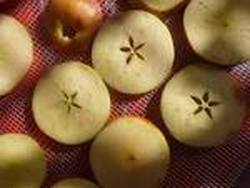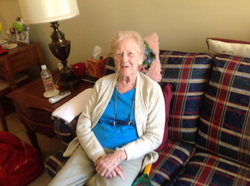 A delicious story for your Tu b'Shvat gala (puns intended) In a great oak forest where the trees grew tall and majestic, there was a little apple tree. It was the only apple tree in the forest and so it stood alone. Winter came. As the snow fell to the forest floor, it covered the branches of the little apple tree. The forest was quiet and peaceful. One night the little apple tree looked up at the sky and saw a wonderful site. Between the branchesof all the trees, the little apple tree saw the stars in the sky, which appeared to be hanging on the branches of the oak trees. "Oh God oh God," whispered a little apple tree, "how lucky those oak trees are to have such beautiful stars hanging on their branches. I want more than anything in the world to have stars of my branches, just like the oak trees have! Then I would feel truly special! God looked down the little apple tree and said gently, "Have patience! Have patience little apple tree!" Time passed. The snows melted and spring came to the land. Tiny white and pink apple blossoms appeared on the branches of the little apple tree. Birds came to rest on its branches. People walked by the little apple tree and admired it's beautiful blossoms. All summer long, the apple tree continued to grow. The branches of the tree formed a canopy overhead as they filled with leaves and blossoms. But night after night, the little apple tree looked up at the sky with the millions, and millions, and millions - and millions of stars and cried out, "Oh God, I want more than anything in the world to have stars in my tree and on my branches and in my leaves - just like those oak trees." And God looked down at the little apple tree and said, "You already have gifts. Isn't it enough to have shade to offer people, and fragrant blossoms, and branches for birds to nest on so they can sing their song?" The apple tree sighed and answered simply, "Dear God, I don't mean to sound ungrateful, but that is not special enough! I do appreciate how much pleasure I give to others, but what I really want more than anything in the world is to have stars, not blossoms, on my branches that I would feel truly special!" God smiled and answered, "Be patient little apple tree." The seasons changed again. Soon the apple tree was filled with many beautiful apples. People walked in the forest. Whoever saw the apple tree would reach up to pick an apple and eat it. And still, when night came to the forest, the apple tree look at the stars in the oak trees and called out, "Oh God, I want more than anything in the world to have stars in my branches! Then I would feel truly special." And God asked, "But apple tree, isn't it enough that you now have such beautiful apples to offer people? Does that satisfy you? Does that give you enough pleasure and make you feel special? Without saying a word, the apple tree answered by shaking its bracnches from side to side. At that moment, God caused a wind to blow. The great oak trees began to sway and the apple tree began to shake. From the top of the apple tree an apple fell. When it hit the ground, it split open "Look," commanded God, "look inside yourself. What do you see?" The little apple tree looked down and saw that right in the middle of the apple - was a star. And the apple tree answered, "A star! I have a star!" And God laughed a gentlelaugh and added, "So you do have stars on your branches. They've been there all along, you just didn't know it." (Origin unknown. Re-crafted by Peninnah Schram and Rachayl Eckstein Davis in The Chosen Tales)
2 Comments
 My mother, Elsie Novak, died on November 6. May her memory be for a blessing My mother, Elsie Novak, died on November 6. May her memory be for a blessing I recall times when as I child I lay sick in bed. My mother would gently rub Vick's VapoRub on my chest, and then cover it with a dry wash cloth. So warm, so soothing, so mentholated. Even now I can feel my mother's hand doing its magic. And when I look at my hands, I see hers - freckled, thin, and yes, aging. If only my hands could pass on comfort as my mother's did. This story took place in the north of Lebanon in the village of Hamadin. And the happening, as told, goes like this: In the village lived a widow and her beautiful daughter, an only child. One day the daughter became ill and was ordered to rest. And so she lay on her bed near the window and looked out at the only tree in the yard. Thus, days, weeks, and months passed, and the autumn came. But the girl's condition didn't improve. On the contrary, she grew worse. And so, one day, as she looked at the tree, she said weakly, "You see, Mother, see those leaves. When the last leaf falls, I will die." The mother's heart grieved, and she watched anxiously as the leaves fell. One cold night the wind howled, and the mother's heart was full of despair, as she saw the wind taking the last leaves. With every leaf her heart sank even deeper. At last there was only one leaf left. What could she do? So the poor woman ran outside, unaware of the cold, the gusts of wind, and the storm. She approached the wall in front of the tree, and there she painted, on the wall, a picture of the last leaf. So good, so accurate was the drawing, that it looked like the last leaf itself. When the girl awoke, she looked out the window, and there she saw one lonely leaf. Days and weeks passed. From time to time she looked out, amd always she saw that last leaf, still hanging on the branch of the tree, A new spirit entered the girl. Slowly, slowly she recovered, and at last she got well. But the mother, by going out on that windy night, had caught cold. She developed tuberculosis, and soon died. When the girl was able to leave her bed, she went outside to see the miracle that had occured: Why had that leaf not fallen? And what did she see? The painting, done by her mother, which had cost her her life for her child's sake. Then the girl realized her mother's great love, and grieved greatly for her mother who, in her own death, had given life to her. The Mother, a Lebanese Folktale, retold by Barbara Rush, from The Jewish Spirit: A Celebration in Stories & Art ººººººººººººººººººººººººººººº
My late rebbe, R' Zalman Schachter-Shalomi, zt"l, (זכר צדיק לברכה) was a master storyteller. He taught, in the name of Abraham Joshua Heschel zt"l: "a mayse is a story in which the soul surprises the mind". "A Year of Stories" is dedicated to his memory. I invite you to forward the link to these stories so that they find their way into the hearts of other listeners and tellers. ∞∞∞∞∞∞∞∞∞∞∞∞∞∞∞∞∞ Please consider offering a tax deductible donation to support this project and the work of DC's Jewish Renewal community Minyan Oneg Shabbat. If you would like to be added to the growing list of "Year of Stories" followers, let me know at [email protected], with "Year of Stories" in the subject line.  This Thursday I head off to Ohalah, what my wife Renée refers to as "a rabbis convention for unconventional rabbis." This will be the first such gathering since the death of Reb Zalman, tz"l, and will then take on special meaning. This post, A Year of Stories #26, marks the 1/2 year since his death on July 3. A few days ago I received in the mail a hardcover copy of Rebbe, the biography of Reb Menachem Schneerson written by Joseph Telushkin. I had not ordered it, so you can imagine my surprise when I discovered a note inside explaining that it was a gift to me from a pair of philantropists who had underwritten the mailing. Wow, that's a lot of bucks - "gimme loot, chasadim!" I immediately looked in the index for Reb Zalman's name, and of course, found a good number of references to him, as he was a musmach (he had been ordained) by the Central Lubavich Yeshiva in 1947. Through the subsequent years Reb Zalman had many interactions with the person who R' Telushkin calls "the most influential rabbi in modern history." Here is a story that Reb Zalman shared with the author about his Rebbe: When Rabbi Zalman Schacter-Shalomi was Hillel director at the University of Manitoba in Winnepeg, Canad, he brought a group of students to meet with the Rebbe in Brooklin. At the conclusion of the rebbe's opening remaks, one of the students, intending to be blunt rather than disrespectful, asked him, "What's a Rebbe good for?" To this day Reb Zalman remembers his feelings at that moment: "I could have sunk through the floor in embarassment." However, the Rebbe didn't seem offended at all and responded to the query directly: "I can't speak about myself, but I can tell you about my own Rebbe (his father in law). For me, my Rebbe was the geologist of the soul. You see, there are so many treasures in the earth. There is gold, there is silver, and there are diamonds. Bit if you don't know where to dig, you'll only find dirt and rocks, and mud. The Rebbe can tell you where to dig, and what to dig for, but the digging you must do for yourself." from Rebbe, by Joseph Telushkin, Pg 209 also, see Reb Zalman's book The Geologist of the Soul: Talks on Rebbe-Craft and Spiritual Leadership ººººººººººººººººººººººººººººº My late rebbe, R' Zalman Schachter-Shalomi, zt"l, (זכר צדיק לברכה) was a master storyteller. He taught, in the name of Abraham Joshua Heschel zt"l: "a mayse is a story in which the soul surprises the mind". "A Year of Stories" is dedicated to his memory. I invite you to forward the link to these stories so that they find their way into the hearts of other listeners and tellers. ∞∞∞∞∞∞∞∞∞∞∞∞∞∞∞∞∞ Please consider offering a tax deductible donation to support this project and the work of DC's Jewish Renewal community Minyan Oneg Shabbat. If you would like to be added to the growing list of "Year of Stories" followers, let me know at [email protected], with "Year of Stories" in the subject line. |
Mark Novak is a "free-range" rabbi who lives in Washington DC and works, well, just about everywhere. In 2012 he founded Minyan Oneg Shabbat, home to MOSH (Minyan Oneg Shabbat), MindfulMOSH (Jewish mindfulness gathering), and Archives
June 2017
Categories
All
|

 RSS Feed
RSS Feed
